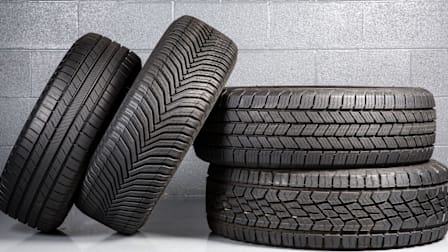Should You Use Synthetic Oil in Your Car?
CR experts tell you everything you need to know about your car’s engine oil

Synthetic oil used to be something only performance cars needed—but not anymore.
Now it’s the manufacturer-recommended engine lubricant in many mainstream vehicles, such as the Subaru Forester and the Toyota Camry.
Why? Modern internal combustion engines have tighter clearances between fast-moving metal parts, which makes them more efficient. That means these engines usually need lower-viscosity oil—oil that’s “thinner” and flows more easily to form a cushion of lubrication between two parts. At lower viscosity, synthetic oil holds up better in high temperatures. Unfortunately, synthetic oil is more expensive. (See the car brands ranked by maintenance and repair costs over time.)
Why Your Car Needs Oil
Motor oil is an engine’s lifeblood. It creates a lubricating film between moving metal parts, keeping them cool and reducing friction. Without it, excessive heat from the parts rubbing together would severely damage the engine and, in the worst case, paralyze the vehicle as spinning chunks of the engine break through the oil pan.
“Oil breaks down and loses its protective properties over time, which is why you need to change it, typically every 5,000 to 10,000 miles,” Ibbotson says. “Engines wear as the miles pile on, and some may burn or leak oil after a while, so it’s vital to regularly check the oil level and top it up between oil changes.” (Learn how to check your car’s engine oil.)
How Often to Change the Oil
Decades ago, the common guidance for oil changes was every 3,000 miles. Many manufacturers now call for oil changes every 5,000 or 10,000 miles (and sometimes more). The best place to find the exact oil change interval recommended by the manufacturer is in your car’s owner’s manual. Some models have a printed copy in the glove box, and others have a digital owner’s manual that can be accessed on a computer or smartphone. Look for a heading such as “service intervals” or “maintenance schedule.”
Some manufacturers specify different oil change intervals for normal, severe, and extreme use. If you use your vehicle regularly for towing, for example, consider following a more frequent oil change interval.
Most newer cars also come with built-in service reminders that issue an alert (usually with a message in the instrument cluster or infotainment screen) when it’s time to change the oil. Most mechanics will place a small sticker in the upper corner of the windshield with the estimated date and recommended mileage for the next service. If they don’t leave one after an oil change, ask them for it. Just make sure to tell the technician to write the factory interval on it rather than a more frequent—and thereby more profitable to them—schedule.
How to Decode Oil Types
The alphanumeric codes on a quart of oil—5W-30, 0W-20, etc.—denote its “weight,” or viscosity. Thicker, higher-viscosity liquids flow more slowly, like syrup; lower-viscosity liquids flow faster, like water.
The first number represents the oil’s viscosity in cold weather (the “W” stands for “winter”), and the second figure represents its viscosity at higher operating temperatures. Heavier oil can make it harder to start an engine on a cold day. The old rule about using higher-viscosity oil in the summer rarely applies today; most auto manufacturers specify using the same oil year-round. “Newer cars typically use lower-viscosity oil because it fits in the tighter clearances used in modern engines,” Ibbotson says.
Conventional vs. Synthetic Oil
Conventional oil is pumped from the ground and refined, while synthetic oil is chemically modified petroleum that’s produced at a factory. Most new cars use synthetic oil, though some still use conventional oil or synthetic blends that combine the two types. (Older cars are more likely to call for conventional oil and synthetic blends.) Any motor oil will do the job, but some types are better than others under certain conditions.
“The big difference is that synthetic oil tends to last longer than conventional oil between changes, up to 10,000 miles or more,” Ibbotson says. “Synthetic oil costs about 30 percent more than conventional oil, but you’ll only need to replace it half as often, offsetting its greater cost.”
Conventional oil, which has a tendency to retain impurities collected within the engine, breaks down quicker than synthetic, becoming less effective as a lubricant. Synthetic oil also performs better in extreme temperatures, both hot and cold.
When to Upgrade Your Oil
“Normally, you should use the oil your owner’s manual recommends,” Ibbotson says. “There’s no need to upgrade to synthetic unless your car falls under the ‘severe usage’ category.”
He says severe use includes taking short car trips that don’t allow the engine to warm up completely (usually drives that last less than 15 minutes), not putting many miles on your car annually, using your car for towing, or living in a place with extreme hot or cold temperatures. In those cases, Ibbotson thinks that synthetic oil is better and can even help prevent premature engine wear.
Synthetic oil can also be good for older cars because it’s less likely than conventional oil to “sludge,” or form a gunky residue when it breaks down. Sludge can block oil passages and lead to engine failure. In the early 2000s, several engine types from Chrysler, Toyota, and Volkswagen, among others, were especially prone to sludge buildup. With new-car prices climbing ever higher and used-car prices still relatively high, some of these older models may even be among your search for a reliable used car.
Checking Your Oil Regularly
CR’s experts say that checking your oil is an important preventive maintenance task for cars that have a dipstick, the long metal strip that extends into the oil pan from near the top of the engine. Most new cars also have an electronic oil level sensor, but it may only alert you when the oil is already critically low.
Plenty of new cars still have dipsticks, and if yours does, check the oil at least once a month. An easy way to remember is to do it every other time you fill up the fuel tank, or roughly once a month. If your mechanic says that your car’s engine is leaking or burning oil, check your oil more often and top off as needed until you get the problem fixed.
“If your car is burning or leaking oil, you want to stay ahead of the oil loss to make sure the engine doesn’t run low on oil,” Ibbotson says.
How to Check the Oil Level
1. Check the oil when the engine is warm unless the manual states to do otherwise. A warm engine is one that has been running enough to reach operating temperature. But never touch or work on a hot engine.
2. With the engine off, pull the dipstick out of its tube and wipe it clean with a paper towel or rag.
3. Fully reinsert the dipstick and pull it out again. The end of the dipstick usually has two lines (hash marks) or dots to denote “full” and “add oil.” If the level falls between the two marks, there’s enough oil. If it’s below the “add” mark, you could fry your engine.
“Many manufacturers advise checking the oil when the engine is cold, but checking it just after you fill the gas tank is fine,” says Michael Crossen, lead technician at CR’s Auto Test Center. “It may read a little low if the engine is still warm, but the important thing is that the level reads between the marks.”
How to Top Off the Oil
1. With the engine off, unscrew the oil fill cap—usually a yellow plastic screw-on cap with “oil” printed on it, located on top of the engine—and use a funnel to add oil. The “add” dipstick mark on some engines indicates it’s a half-quart low; in others, it’s a full quart.
2. Start by adding half a quart. Wait for the new oil to drain into the bottom of the engine, check the level again, and then add more oil if necessary.
3. Repeat until the oil level is between the dipstick’s “full” and “add” marks.
Be patient, and never overfill the oil. Doing so can cause serious problems, including premature engine wear and leaks. “You don’t have to fill the oil all the way. Just make sure it’s between the marks on the dipstick,” Crossen says.
Some newer vehicles don’t have a dipstick at all and use an internal monitor to track the oil level. This is displayed either in the gauge cluster (often called the Driver Information Center, or DIC) or in a menu item in the infotainment system. The systems will indicate how much oil to add, either half a quart or a full quart. After you add the oil, you’ll want to check the oil level again using the system. Your owner’s manual will say how to cycle the system to check the level after topping off the oil.
Editor’s Note: Portions of this article also appeared in the November/December 2024 issue of Consumer Reports magazine.




